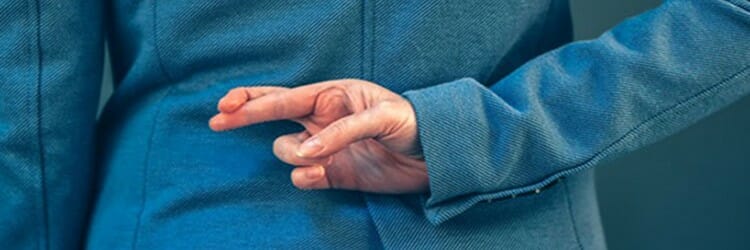
“I Lied About Everything, All the Time”
By. Mary R., Crossroads Volunteer Recovery Blogger
When I was deep into my alcoholism, lying became a way of life. And not just lying about Big Things. I’d lie about even the littlest things, for no reason whatsoever. Lying had become just as bad of a habit as the drinking.
Why did my active alcoholism make me a chronic liar? I lied to keep my alcoholism and my activities a secret. I would say and do anything to protect my disease.
But why did I lie about other things too, about things so benign that a lie was completely unnecessary? I don’t really know. I was an alcoholic, and therefore a liar. They seem to go hand in hand.
The lies became so natural, they seemingly rolled off my tongue, smooth as silk. I even started believing my own lies. I thought it was a survival mechanism, but that turned out to be a lie too.
A typical day of dishonesty
I woke up, took a shower, and was getting ready for work. My hands were shaking badly. I didn’t have anything to drink in the house, so with my hair half-wet, wearing sweatpants and a T-shirt, I drove to Walgreens and bought a bottle of cheap wine . . . plus a gift bag and a card. I told the checkout lady we were having a party to celebrate my manager’s engagement, and I was supposed to bring wine. I’m sure she shook her head as I walked away, knowing the sad truth.
Another time, my husband and I were putting up the Christmas tree. I was pretending to be sober, but I really needed a drink. I told my husband the tree would look better with more lights, so why didn’t he run up to Target and get a couple strings. While he was out, I hopped in my car and got to the liquor store and back before he returned. Lie invented, problem solved.
There were trips to the store for dog food we didn’t need. Begging off going to the movies with my kids because of a headache I didn’t have. Even going to an AA meeting that didn’t exist. Any excuse to get what I wanted — alcohol. Lies to my loved ones, to my employers and co-workers, to total strangers. I simply had to make it all make sense, be respectable . . .
Getting rigorously honest
In AA, I was told to practice rigorous honesty. That meant telling the truth about where I was going, where I’d been, how I spent my money, and just being honest about not drinking.
But real honesty involves so much more. It means not saying “yes” when I mean “no.” (As notorious people pleasers, we alcoholics and addicts need to work on this one!) It means ’fessing up after the fact about telling lies or half-truths.
And it means checking my motives. Am I hiding a bad motive beneath something that looks good on the surface? Am I selfishly trying to get something for myself while making my actions appear to be pure and worthy? Sometimes this takes a little digging, but if I’m honest with myself, the answers come.
The truth will set you free!
At a recent doctor’s appointment, I was filling out the patient information form when I came to this question: “How many alcoholic drinks do you consume per week?”
I simply wrote “0.” It was so easy and I didn’t have to think about it or explain it. I’ve come to learn there really are people who just don’t drink. Imagine that! Years before, I’d answered that question with: “Two glasses of wine with dinner on weeknights, maybe three on weekends.” And my doctor told me to go to AA. Just imagine if I’d been really honest — that I was actually consuming in one day what I’d written I would drink in a week.
What a hard job it was to think up all those lies and excuses.
The freedom to tell the truth, to embrace a lifestyle of rigorous honesty … these are necessary on the path to sobriety. But they then become the true blessings of life as a recovering alcoholic.
“You shall know a new freedom and a new happiness,” says AA’s Big Book. Truer words were never spoken!
About the Author:
Mary R. is a wife, mother, daughter, retired business owner and recovering alcoholic who relocated to southwest Florida from Ohio. As a person in recovery, she writes from the heart and shares her strength, hope and experience with others so that they too may recover from the prison of addiction. Her sobriety is strongly engrained in the belief that “you can’t keep it unless you give it away.” When not volunteering for David Lawrence Centers or actively participating in 12-step meetings, you can find her living her life in recovery to its fullest potential playing tennis, traveling, or trying out a new recipe with family and friends.
About Crossroads
If you or someone you know is struggling with alcoholism or any kind of addiction, we can help you here at Crossroads Rehab in Naples, Florida. Crossroads is a state-of-the-art alcohol treatment center. We take a holistic and individualized approach to your rehab and recovery, addressing your physical, emotional, social, and spiritual needs.
We have a number of substance use treatment services for adults including inpatient detoxification, and residential and intensive outpatient rehab services provided by the David Lawrence Centers .
A new life of healing, hope, and recovery can start today at Crossroads. We understand that choosing the right treatment program is a critically important and life changing decisions so we encourage you to learn more about us and read our recovery stories today.
To get help for you or a loved one, don’t hesitate to contact us online today or call 239.354.1428.
Error: Contact form not found.
Jul 05, 2017 | Blog



